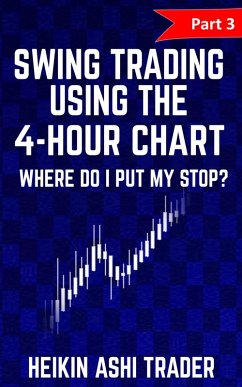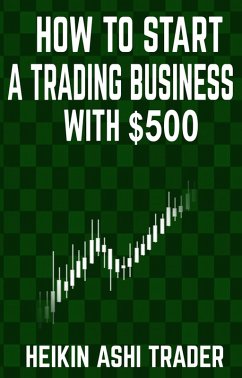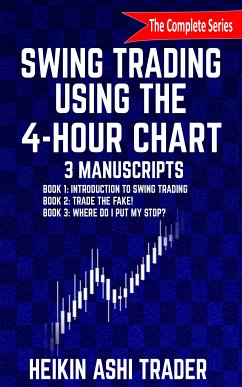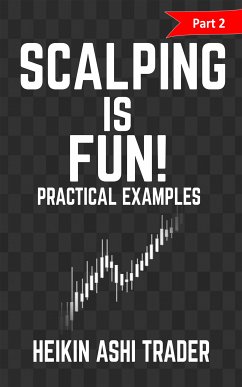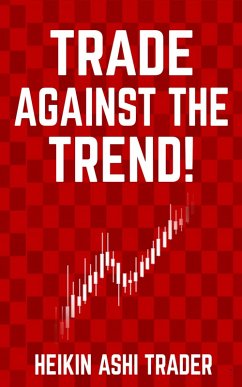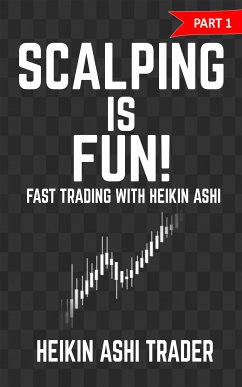
How to Develop a Profitable Trading Strategy (eBook, ePUB)
Why You Should Do the Opposite of What the Majority of Traders are Trying to Do

PAYBACK Punkte
0 °P sammeln!
How to Develop a Profitable Trading StrategyWhy You Should Do the Opposite of What the Majority of Traders are Trying to DoTraders become active in the stock market for no other reason than to collect points, ticks and pips. As much as possible and as fast as possible. Everything else is pastime and useless analysis. Traders therefore need a method, a system that does exactly that: accumulating small profits permanently, which eventually adds up to a considerable plus in the account.For this to happen, the author takes the classic recommendation "cut your losses and let your profits run" under...
How to Develop a Profitable Trading Strategy
Why You Should Do the Opposite of What the Majority of Traders are Trying to Do
Traders become active in the stock market for no other reason than to collect points, ticks and pips. As much as possible and as fast as possible. Everything else is pastime and useless analysis. Traders therefore need a method, a system that does exactly that: accumulating small profits permanently, which eventually adds up to a considerable plus in the account.
For this to happen, the author takes the classic recommendation "cut your losses and let your profits run" under the magnifying glass. In this book, he does the opposite of this well-meaning advice: keep profits as small as possible and choose losses as great as possible.
In the second part of the book, he is investigating a strategy that works with this premise. And the historical backtesting gives him right. When traders do the opposite of what the crowd is trying to do, they finally have success!
Table of Contents
Part 1: Do the Opposite of What the Crowd of Traders is Trying to Do! 1. What Traders Can Learn from Automatic Trading Systems 2. Do the Opposite of What is in the Trading Books Assertion 1: Cut your Losses and Let your Profits Run Assertion 2: Try to Achieve a Good Risk Reward Ratio Assertion 3: You only Need a Hit Rate of 33.33% 3. Aim for a High Hit Rate 4. Why Trading Strategies with "Good" RRRs Are Usually Unsuccessful 5. Praise of the Take Profit Order 6. Praise of the Automatic Entry
Part 2: Trading Strategies with a Small Price Target and a Wide Stop Test 1: German Bund Future, Crossing Moving Average Strategy Test 2: E-Mini, Crossing Moving Average Strategy 1 Test 3: E-Mini, Crossing Moving Average Strategy 2 Conclusion Glossary More Books by Heikin Ashi Trader About the Author
About the Author
Heikin Ashi Trader is the pen name of a trader who has more than 17 years of experience in day trading futures and foreign exchange. He specializes in scalping and fast day trading. In addition to this, he has published multiple self-explanatory books on his trading activities. Popular topics are on: scalping, swing trading, money- and risk management.
Why You Should Do the Opposite of What the Majority of Traders are Trying to Do
Traders become active in the stock market for no other reason than to collect points, ticks and pips. As much as possible and as fast as possible. Everything else is pastime and useless analysis. Traders therefore need a method, a system that does exactly that: accumulating small profits permanently, which eventually adds up to a considerable plus in the account.
For this to happen, the author takes the classic recommendation "cut your losses and let your profits run" under the magnifying glass. In this book, he does the opposite of this well-meaning advice: keep profits as small as possible and choose losses as great as possible.
In the second part of the book, he is investigating a strategy that works with this premise. And the historical backtesting gives him right. When traders do the opposite of what the crowd is trying to do, they finally have success!
Table of Contents
Part 1: Do the Opposite of What the Crowd of Traders is Trying to Do! 1. What Traders Can Learn from Automatic Trading Systems 2. Do the Opposite of What is in the Trading Books Assertion 1: Cut your Losses and Let your Profits Run Assertion 2: Try to Achieve a Good Risk Reward Ratio Assertion 3: You only Need a Hit Rate of 33.33% 3. Aim for a High Hit Rate 4. Why Trading Strategies with "Good" RRRs Are Usually Unsuccessful 5. Praise of the Take Profit Order 6. Praise of the Automatic Entry
Part 2: Trading Strategies with a Small Price Target and a Wide Stop Test 1: German Bund Future, Crossing Moving Average Strategy Test 2: E-Mini, Crossing Moving Average Strategy 1 Test 3: E-Mini, Crossing Moving Average Strategy 2 Conclusion Glossary More Books by Heikin Ashi Trader About the Author
About the Author
Heikin Ashi Trader is the pen name of a trader who has more than 17 years of experience in day trading futures and foreign exchange. He specializes in scalping and fast day trading. In addition to this, he has published multiple self-explanatory books on his trading activities. Popular topics are on: scalping, swing trading, money- and risk management.
Dieser Download kann aus rechtlichen Gründen nur mit Rechnungsadresse in A, B, BG, CY, CZ, D, DK, EW, E, FIN, F, GR, H, IRL, I, LT, L, LR, M, NL, PL, P, R, S, SLO, SK ausgeliefert werden.





